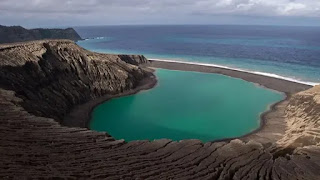Hunga Tonga is a scientific marvel, being one of the mere three volcanic islands to emerge in the last 150 years. Researchers have primarily studied this island remotely, using airplanes and satellite imagery. However, an expedition to the island in October 2018, organized by the Woods Hole Oceanographic Institution, allowed scientists to directly explore this new geological formation.
Dan Slayback, a remote sensing technician from NASA's Goddard Space Flight Center, was part of this expedition. The team conducted GPS measurements and drone surveys, providing valuable insights into the island's landscape. Despite its apparent flatness from the satellite view, the island presented an interesting relief due to wave action and a peculiar, sticky clayey mud.
Intriguingly, life has quickly established itself on Hunga Tonga. Bird droppings have seeded patches of vegetation, and a variety of seabirds, including sooty terns and a lone barn owl, have made the island their home. Despite its uncertain future, Hunga Tonga stands as a testament to the power of nature and a unique subject for scientific exploration.
Located above one of Earth's most volcanically active regions, the Hunga Tonga volcano in Tonga has been notably dynamic, particularly in the past decade. After a significant eruption in 2009, another in late 2014 culminated in the formation of a new island on January 16, 2015. Contrary to expert predictions of its brief lifespan, the island survived the initial critical period. This led a team from the University of Boulder, Colorado to establish a temporary base on the island to observe the early stages of a new ecosystem's development.
Rather than discovering microorganism communities similar to those found after a glacier's retreat, the team found unique bacteria that utilized sulfur and other volcanic eruption gases for their metabolism.
However, the intrigue was short-lived. The prophecy of the island's demise came true in January 2022, seven years late, when an eruption wiped out Hunga Tonga Hunga Ha'Pai. With the island gone, the study of its unique bacteria came to a halt. Nicholas Dragone, the research's lead author, is now awaiting the emergence of another similar island to continue the work.
Although volcanic islands often only endure for a few months before erosion renders them extinct, Hunga Tonga resisted this fate. However, the same volcano that birthed it annihilated it with one of the most powerful eruptions recorded in recent decades.


Post a Comment